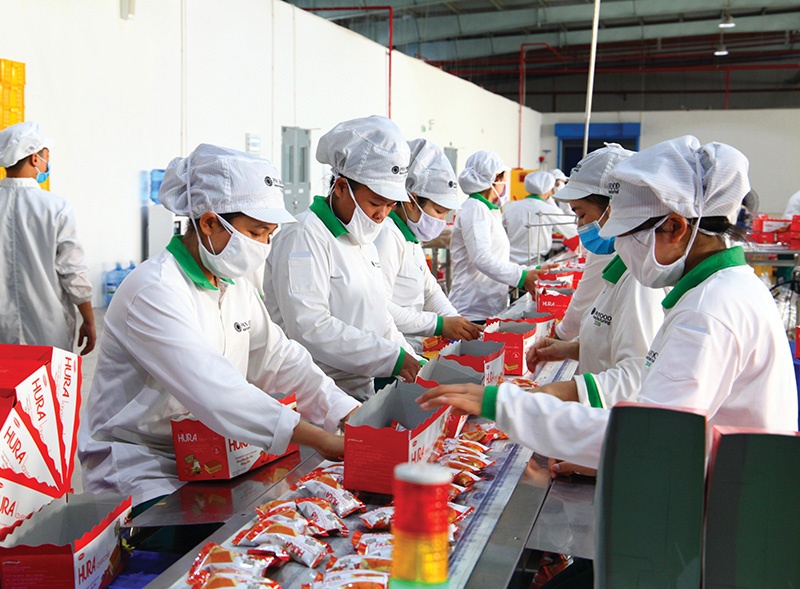Businesses paying greater attention to equality at work
 |
| Women-led enterprises are more likely to be of micro or small size |
Wider diversity and inclusion is now representing a greater building block for big-name businesses and becoming more fundamental to their core values.
For example, at Nestlé, the principle of gender equality is reflected in the company’s policies and strategies for human resource development such as recruitment, succession planning, and promotion. The proportion of women holding senior management and leadership positions is 42 per cent, while the percentage of female farmer group leaders has so far reached 30 per cent of those participating in the company’s NESCAFÉ Plan.
Elsewhere, Unilever Vietnam’s efforts have been well-recognised with two precious WEP (Women Empowerment Principles) awards – Leadership Commitment and Gender-Inclusive Workplace in 2020 and Gender-responsive Marketplace in 2021. Unilever Vietnam also breaks down women’s promotion barriers by building a training and development roadmap and nominating women to leadership positions with a proportion of female managers of nearly over 50 per cent.
In a profession traditionally considered a male-dominated workplace, tech giant Ericsson is actively working with academic institutions to attract women to take up exciting careers within the ICT sector and to join its graduate programmes. It provides equal growth opportunities for female employees to adopt skills in advanced technology and has created focused talent development programmes to cultivate female talent for leadership roles.
Denis Brunetti, president of Ericsson for Vietnam, Myanmar, Cambodia, and Laos; board member of Vietnam Business Coalition for Women's Empowerment (VBCWE) told VIR, “Our objective is to promote gender diversity in a full cycle, building a pipeline of female talent that will be ready to take on leadership roles to take on the challenges of tomorrow, including the realisation of Industry 4.0.”
Ericsson is fully supporting and is aligned with the government’s National Industry 4.0 and Digital Transformation strategy, and is committed to helping promote more women in the ICT industry. “Women in ICT will play a significant role in securing the national agenda to have the Digital Economy contribute to 25 per cent of GDP by 2025, and 30 per cent by 2030,” Brunetti added.
Acknowledging the importance of bridging the gender gap, the Vietnamese government has made it a priority to increase the participation of women in the workplace. To help facilitate these goals, the Vietnamese government adopted a National Strategy on Gender Equality for the 2021-2030 period.
The United Nations Development Programme has also approved the Country Programme Document for Vietnam for the 2022-2026 period and a financial package worth over $120 million. One of the most important aspects of the financial package is directed towards human rights, gender equality, and freedom from all forms of violence and discrimination in line with Vietnam’s international commitments.
Statistics published by the Vietnam Association For Women Entrepreneurs show that the rate of female directors or owners is currently at 26.5 per cent. The figure is expected to reach at least 27 per cent by 2025 and 30 per cent by 2030. In the past, Vietnam has witnessed steady progress in female entrepreneurship as it ranked 10th in Asia and 25th globally in 2020 for the proportion of female participation in entrepreneurial activities.
“Organisations must understand that a diverse and inclusive work environment allows them access to a wider talent pool, thus increasing the chances of finding the best people suited for the roles. Even from the jobseekers’ perspective, diversity in the workplace is one of the key factors in their decision-making process,” Brunetti said.
Along with strategies to boost gender equality in the workplace, implementing programmes to accompany women in rural areas to change their lives is a typical activity of businesses. Unilever Vietnam has cooperated with the Vietnam Women’s Union since 2007 to implement programmes to empower women in difficult circumstances across the country with a commitment to invest more than $10 million.
The highlight of Unilever Vietnam’s programmes is the financial fund that supports 50,000 women and their families in business with a total loan of about $15.2 million, along with health and hygiene education and other activities. The goal is to provide educational support to five million women by the end of 2025.
What the stars mean:
★ Poor ★ ★ Promising ★★★ Good ★★★★ Very good ★★★★★ Exceptional
Themes: Empowering Women
- Female influence still to be attained
- Shaping Vietnam's corporate future: female board members show business excellence
- Nestlé Vietnam contributes to elevating the role of women across the supply chain
- Empowering female leaders in tech: insights and aspirations shared at KPMG Tech Innovator 2023
- Brighter Path programme hosts empowerment meeting for ethnic minority girls
Related Contents
Latest News
More News
- PM outlines new tasks for healthcare sector (February 25, 2026 | 16:00)
- Ho Chi Minh City launches plan for innovation and digital transformation (February 25, 2026 | 09:00)
- Vietnam sets ambitious dairy growth targets (February 24, 2026 | 18:00)
- Masan Consumer names new deputy CEO to drive foods and beverages growth (February 23, 2026 | 20:52)
- Myriad risks ahead, but ones Vietnam can confront (February 20, 2026 | 15:02)
- Vietnam making the leap into AI and semiconductors (February 20, 2026 | 09:37)
- Funding must be activated for semiconductor success (February 20, 2026 | 09:20)
- Resilience as new benchmark for smarter infrastructure (February 19, 2026 | 20:35)
- A golden time to shine within ASEAN (February 19, 2026 | 20:22)
- Vietnam’s pivotal year for advancing sustainability (February 19, 2026 | 08:44)

 Tag:
Tag:




















 Mobile Version
Mobile Version